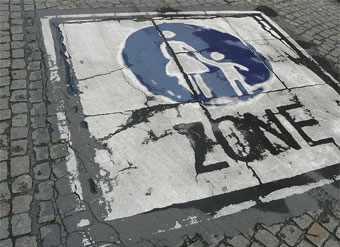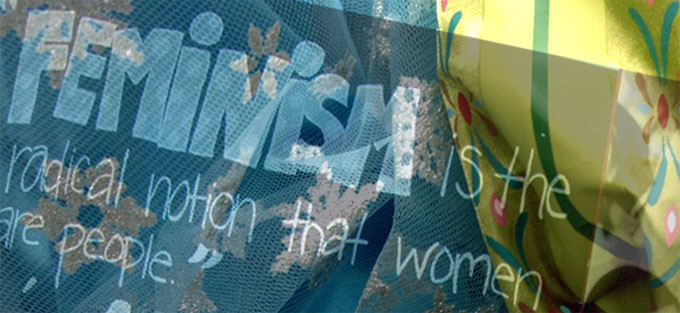by K. M. Deaver
This past Christmas as I selected gifts for my two young nieces, I was struck by the abundance of “new” fairytales. For my nieces, anything having to do with the Disney movie Frozen was at the top of their wish list. In many ways, the themes and character roles in Frozen are inspiring from a feminist point of view.
Frozen presents us with strong female leads, and we also encounter an assumed white knight who later reveals his true colors and an overlooked male character who supports the female leads in their actions. In addition, the act of selfless true love–which all good fairy tales need–occurs between the two sisters, not between a princess and her prince. Fairy tales are moving forward from the assumption that a white knight must save the helpless princess. Our discussions on gender equality should move in this direction as well.
The role of male feminists
Defining feminism |
|
| noun. fem·i·nism \ˈfe-mə-ˌni-zəm\ the theory of the political, economic, and social equality of the sexes | |
A few months ago social network and media sites were abuzz with headlines and stories considering the role of men in the women’s liberation movement. My early education about the women’s movement defined a true feminist as a female-bodied individual who identified as a woman. Consequently, the recent discussions surrounding “male feminists” leave me a bit apprehensive.
Don’t get me wrong, I absolutely believe that male-bodied human beings have a role to play within the women’s movement. But defining these men as feminists rather than as allies to the feminist movement can be problematic. For me, the term feminist is designed to acknowledge the lived out oppression of being a female-bodied individual within our society. I feel that male-bodied human beings then cannot fully experience this form of oppression.
In the same vein, as a White woman, I cannot fully understand the lived experiences of women of color and, therefore, cannot define myself as a womanist. I can define myself as a womanist ally because I see and acknowledge the oppression of African American women within our society.
So what does this information mean for us as people in the church? How might the women and men of the church, work to empower women? How might we discard our conversations about “women’s issues” and instead have these conversations in the context of “human issues?” How can women inspire and educate men and boys to accompany us as allies in the struggle against oppression rather than relying on them to be the white knights from the fairy tales of long ago?
Gender roles: Let it go
 I believe we first need to acknowledge that sexism is rooted within the socially constructed gender roles that our society imposes upon us from the moment we are born. These gender roles hurt all people, not just women. These roles tell us that men are supposed to be confident, aggressive and dominant, while women are to be insecure, passive and submissive. How many men and women do you know who actually fit those roles all of the time? When we assign genders to characteristics that are merely human characteristics, we limit the flourishing and success of all individuals.
I believe we first need to acknowledge that sexism is rooted within the socially constructed gender roles that our society imposes upon us from the moment we are born. These gender roles hurt all people, not just women. These roles tell us that men are supposed to be confident, aggressive and dominant, while women are to be insecure, passive and submissive. How many men and women do you know who actually fit those roles all of the time? When we assign genders to characteristics that are merely human characteristics, we limit the flourishing and success of all individuals.
We must also hold each other (men and women) accountable for calling out oppression and abuse whenever we see it. Not being the one who is telling the sexist joke is not enough. Rather, standing up and saying “Hey, that isn’t funny” is an everyday way to call out oppression and sexism.
In addition, we must accept that when it comes to oppression, inaction is a form of action. Even if we are not directly victimizing someone else or the one being victimized, we are bystanders within the larger narrative of society and have a responsibility to stand in solidarity against all forms of oppression.
Just as St. Paul reminds us in a number of his letters (1 Corinthians 12) the body is made up of many members. We are all one body in Christ. Each member is important and necessary to the way in which the body as a whole flourishes. When all members are able to flourish and live into their role as part of the body, the entire body will flourish.
We are relational beings, and we need one another to flourish. But the women’s movement will not succeed by relying on men to be the white knights or counting on them to give up their privilege to help women. Rather, the movement will succeed when men accompany women on the journey, working beside us as partners, allies, and friends. In many ways, Frozen does provide us with a positive model in this regard.
In an attempt to gain the kingdom for himself, Hans, the assumed white knight in Frozen, refuses to save Anna with a true love kiss. Yet, Kristoff accompanies Anna in her attempt to find and reconcile with her sister, Elsa. He does this in ways that are not overbearing nor controlling, but rather supportive and empowering for both of them. Kristoff, then, becomes a model of what genuine care and accompaniment on the part of male allies to the feminist cause might look like in our society. The invitation is open, let men walk with us.
Discussion questions
1. In what ways do we impose society’s gender roles on individuals in our church communities?
2. How do you accompany people in your daily life?
3. Where do you see God accompanying those who are oppressed?
4. The Webster’s dictionary defines feminism as: “a doctrine that advocates equal rights for women.” What does that mean to you?
Closing prayer
Emmanuel, God with us, teach us to support and love one another just as you love and support us. Open our minds to the experience of others that we might seek to end all forms of oppression. In your name, we pray. Amen.
K. M. Deaver is currently pursuing a Ph.D. in Feminist Theology and Ethics at the Lutheran School of Theology at Chicago. Her areas of interest include sexual ethics and helping end the oppression and exploitation of women and girls around the world.


Love this–and it makes me even happier that I know you. Thanks for your words of wisdom, friend 🙂
Thank you so much for your insightful writing. Articles like this provide a framework for our faith lives to follow. It encourages and challenges me to be ever present in my faith and not a “passer-by.” I look forward to more of your writing
Ah, transphobia! This article reeks of it.
What a giant step backwards for Feminism!
We need to move beyond Trans Exclusionary Radical Feminism. This is unacceptable. How a person is “bodied” is irrelevant. If a person ID’s as a woman, she is a woman. If a man gets beaten for acting feminine, he is oppressed by the same brand of misogyny as any so called “bodied” woman.
Women denying the oppressive experiences of those they refuse to consider as women are practicing a highly oppressive form of misogyny themselves.
Gender is not limited to male and female. Misogyny affects all genders. Therefore, people of all gender expressions can be feminists.
I was trying to best all the boys in my neighborhood when I was a young girl. Was called a TOM BOY. Was a girl and wanted to be a girl just wanted to prove that I was better than any boy. I was an only child so maybe I had to be the boy and the girl to my parents. Got married had two children and was happy. Husband is now X because he cheated on me. Then I went to college, took extra classes and made a career for myself. My career was in one of the jobs where women and men are paid the same if they are good at what they do. I was a senior consultant for a top soft ware company out of California. So often I would be able to tell men that they were wrong, confidence was all mine. I loved my job, loved the pay as well. I was on the road 100% of my time so saw lots of the world too. I am 72 now but my younger years no man had better say to me, let me do that. I did two timing chains in my day. That is not an easy repair on a vehicle. Put in my own inground swimming pool with a vinyl liner. We dug the whole hole with neighbors helping hoping they could swim too. Learned how to use a transient so both sides were even. Did have someone do the electric. Do not know why I was like this, it started at a very young age and still is part of my personality today. Now I am still going to school, now the seminary, Wartburg Theological Seminary in Iowa. What a trip this is. God help me!
I am not a Christian, I came by this website looking for YA Ezines. I did however truly enjoy this article. Sadly I seem to hear only extremist views coming from the Christian right, decrying feminism. This was refreshing and well written.
Best Wishes from Northern Ireland